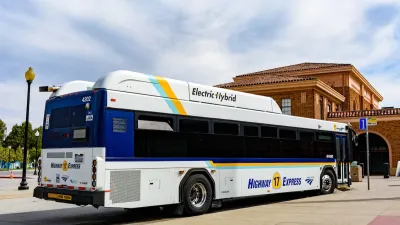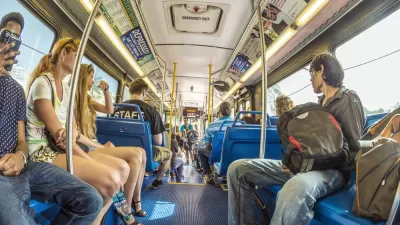After reading this story about a transit agency surveying their customers, I thought to myself: do riders really want another survey asking whether they are satisfied or how clean the stations are? Although clean stations are certainly better than unclean stations, I suspect that these are not transit riders' major priorities. (And when I say "transit riders" I really of course mean "myself").
After reading this story about a transit agency surveying their customers, I thought to myself: do riders really want another survey asking whether they are satisfied or how clean the stations are? Although clean stations are certainly better than unclean stations, I suspect that these are not transit riders' major priorities. (And when I say "transit riders" I really of course mean "myself").
A bus is not a home. A bus (or train) is someplace you spend a few minutes in on the way to home or work (or some other destination). So the most important thing about a bus or train is whether it gets you to your ultimate destination quickly and reliably.
If I am right, the most important thing about my transit service is whether it stays quick and reliable by surviving the next round of budget cuts.(1) So maybe transit authorities should be surveying their customers about how to deal with austerity. For example, a transit authority could ask customers whether, assuming other government agencies will not close a gap between revenues and spending, the authority should solve that revenue gap through:
*raising fares by amount X (X being the amount needed to close the revenue gap)
*eliminating bus routes X, Y and Z (X, Y and Z being the bus routes most likely to be eliminated)
*increasing headways (time between buses), and/or
*curtailing late-night service (and of course whatever other options the transit authority might consider!)
These sorts of questions would certainly be of more interest to me than a survey asking how satisfied I am.
(1) Or, in good times, is improved as revenue grows.

Alabama: Trump Terminates Settlements for Black Communities Harmed By Raw Sewage
Trump deemed the landmark civil rights agreement “illegal DEI and environmental justice policy.”

Study: Maui’s Plan to Convert Vacation Rentals to Long-Term Housing Could Cause Nearly $1 Billion Economic Loss
The plan would reduce visitor accommodation by 25% resulting in 1,900 jobs lost.

Planetizen Federal Action Tracker
A weekly monitor of how Trump’s orders and actions are impacting planners and planning in America.

Wind Energy on the Rise Despite Federal Policy Reversal
The Trump administration is revoking federal support for renewable energy, but demand for new projects continues unabated.

Passengers Flock to Caltrain After Electrification
The new electric trains are running faster and more reliably, leading to strong ridership growth on the Bay Area rail system.

Texas Churches Rally Behind ‘Yes in God’s Back Yard’ Legislation
Religious leaders want the state to reduce zoning regulations to streamline leasing church-owned land to housing developers.
Urban Design for Planners 1: Software Tools
This six-course series explores essential urban design concepts using open source software and equips planners with the tools they need to participate fully in the urban design process.
Planning for Universal Design
Learn the tools for implementing Universal Design in planning regulations.
Caltrans
Smith Gee Studio
Institute for Housing and Urban Development Studies (IHS)
City of Grandview
Harvard GSD Executive Education
Toledo-Lucas County Plan Commissions
Salt Lake City
NYU Wagner Graduate School of Public Service






























